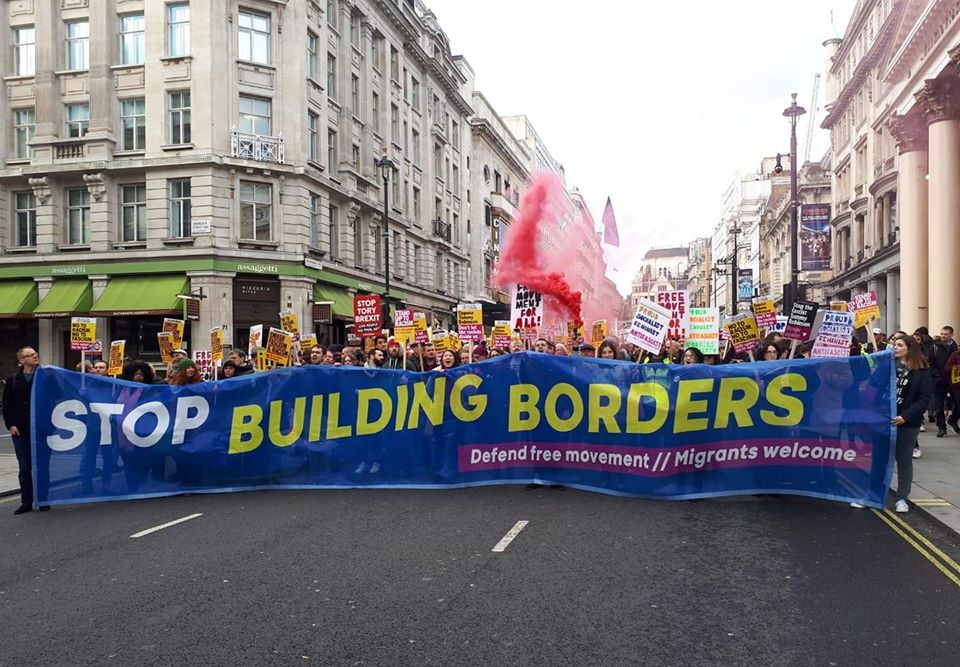Dec 20, 2023
Against the racist states of Europe
Last night the French parliamentary assembly passed an immigration law that introduces ‘national preference’ in access to social services that are in principle universal, a longstanding demand of the National Front that Le Pen swiftly claimed as an ‘ideological victory’. The same evening, negotiators of the European institutions found a preliminary agreement on reforming common asylum rules which increases arbitrary detention, fast-tracks deportation and introduces racial profiling at the border. In both processes of finding political compromise the pattern has been the same: the discussion of an initial proposal that claims to strike a balance between more solidarity for those in need and more restrictive access to asylum becomes dominated by the far-right, with the active complicity of the centrists, and ends up almost entirely repressive. This could be an object lesson in what happens when you allow the possibility of compromising on human and fundamental rights – they quickly collapse. And the worst excuse, used over and over again, is that by making this compromise, responsible leaders are forestalling the rise of the extremist racist right. Quite the opposite is what is happening.
For there is no doubt who is celebrating: it is plainly visible for all to see. Le Pen is celebrating today, and just last weekend the party was in Rome, when hard-right Italian Prime Minister Giorgia Meloni hosted a grotesque spectacle at her Brothers of Italy Party ‘Atreju’ festival. Meeting with UK Prime Minister Rishi Sunak , Albanian Prime Minister Edi Rama and billionaire Elon Musk she discussed more plans to ‘offshore’ asylum processing on the model of the EU-Tunisia agreement and the Italy-Albania agreement, and more deportation plans on the model of Sunak’s unlawful Rwanda asylum plan, which has also recently seen admiration from the leaders of Germany and Austria, themselves perversely persuaded that contemplating such measures might save their political skin.
That these repressive measures do almost nothing to improve the situation for any migrants, for the settled populations in Europe, or for the countries that people are leaving from is largely beside the point. The far right does not deal in material realities, it deals in moral abasement: where the death of a baby girl in a detention centre in the Netherlands was fatal for the governmental coalition of Mark Rutte, it was an enabler for Geert Wilders and his racist policies that would do nothing to prevent such things happening; the arrival of too many migrants to safely process in Lampedusa was not a reason for Meloni to call for a European scheme to adequately address this, but to call for a totally illegal EU naval blockade to block people at sea… and so on. We are all familiar with the pattern, and with the spinelessness of too many of those politicians charged with safeguarding constitutional values when faced with it: President of the European Commission Von Der Leyen said she was supportive of exploring such options…
We are all familiar with the pattern, and with the spinelessness of too many of those politicians charged with safeguarding constitutional values when faced with it: President of the European Commission Von Der Leyen said she was supportive of exploring such options
Part of the antidote to this doom loop is amplifying every action which is based on human solidarity with those migrating: from individuals welcoming refugees, to teams on boats rescuing people, to local municipalities or cities and regions refusing to put in place national racist policies (and at least two departments in France have already announced they will not apply the immigration law). And the other part of the antidote must be a courageous politics which sets out what a morally dignified Europe that can live up to its professed values would have to look like: it would require investment both in properly welcoming and giving political voice to migrants as well as in giving new skills to live in diversity to settled populations; it would require ensuring adequate pay of migrant labour and adequate taxation of the multinationals that benefit most from it; so that the economic ‘diversity dividend’ can be channelled back into society not into private pockets; it would require a Europe-wide industrial and economic policy that avoids the concentration of social problems in specific territories; and it would require a European neighbourhood policy in the South and the East which is not based on blackmail, but it based on sustainable investment conditional on human rights and democracy. We have to argue that such a program, far from being unrealistic, is the only way Europe can live in peace with itself.
